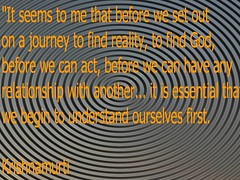 |
| reality (Photo credit: Loulair Harton) |
When does a story become a story? How do you combine truth and fiction in a package that both entertains and enlightens the reader?
That’s a subject that came up recently at one of my writing critique groups. While discussing the young ages of the characters in my novel-in-progress, I admitted that some of the characters are based on real people I knew during my childhood. I’ve found that it is easier to write the story this way, as I have in my mind concrete images of what these people looked like. I have a sense of their personalities (or as much as I remember them), and it feels like I’m writing about real people. In a sense, I am.
So, what makes this a fictional story instead of an autobiography? Well, my characters have super-powers, for one thing.
But that’s not enough, as I’m coming to realize the deeper I get into the novel. The advice given to me by one of my fellow writers was that, at some point, you have to let the fiction take over.
This compelling advice came from a writer who knows what she’s talking about. She is writing a book on domestic violence based in large part on her own experience. However, there are many events in the book that never happened in her real life (though they may have happened to other victims of domestic abuse). One of the other writers in our group was stunned when the author admitted that a skillfully depicted scene involving a car crash never happened to her.
So, how does one go from reality to fiction?
I’m still working out the answer for myself, but here’s what I’ve discovered so far:
- Start with a firm basis in reality. If you want to base your characters on real people in the first draft, it’s okay to do so. Bear in mind, though, that you may have to change them when you write subsequent drafts so the real people don’t recognize themselves too easily. The last thing you want is for Uncle Joe to call you up and say, “Why did you turn me into a drunken wife beater? I never did any of those things!”
- Be clear on the truth you are trying to tell. What is the point of this story? Why is it worth writing? In a grad school screenwriting class, the professor recommended that we write the theme of the story at the top of every page to avoid getting sidetracked. If you don’t know your theme yet, that’s okay. Write at the top of each page what you hope the reader will get out of your story.
- Revise, revise, revise. It goes almost without saying that you’re going to write more than one draft, anyway. In subsequent drafts, you get to know your characters better and have a firm understanding of what’s at their core, what you can change, and what you can’t.
- Have others read your work-in-progress. They will point out inconsistencies that you would never think of or that make sense in reality but don’t in fiction. (Just because Uncle Joe has a lisp does not mean his story analogue should have one.) Good readers will ask the hard questions that you wouldn’t think of or may not want to ask.
- Never get too attached to anything you’ve written. There’s an old axiom in writing: “Kill your children.” Everything you’ve written is subject to change until it sees print (and, given the possibilities of e-books and the like, maybe not even then).
All good stories have some basis in reality, some truth that lies behind the fiction. Begin with that truth, but be willing to change everything else so your story can have the impact you desire on the reader.
Tell me your thoughts: How do you let the fiction take over?
To leave a comment, click on the title of the article, above, and then scroll down.


4 comments:
Excellent points. As writers, we write about what we know. I use experiences from dealing with my own children to bring my characters too life. I try to eliminate in lisps. Thanks for sharing.
Wonderful tip, Kristi. Using our own experiences adds veracity to the story. Thanks for stopping by.
My favorite comment: "Just because Uncle Joe has a lisp does not mean his story analogue should have one." There is the potential trap of a writer feeling too obligated to remain too authentic in the portrayal of a reality-based character or even scene. It's good to keep in mind that the fiction is supposed to be an "alternate" reality and doesn't have to incorporate all the ideals of the actual reality. Thanks for the tips, Greg!
Authentic portrayals are necessary only in biographies, profiles, or historical fiction. Everything else can be boiled down to one consideration: Why is it necessary for me to base this character on a real person? When you answer that question you can disregard everything else.
"Alternate reality" is a good way of looking at it. Thanks for stopping by, Dave.
Post a Comment